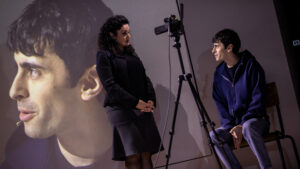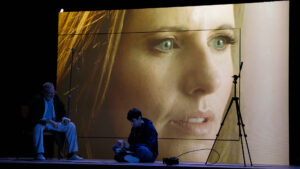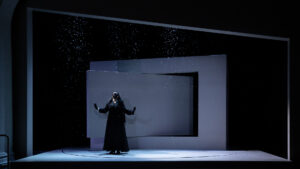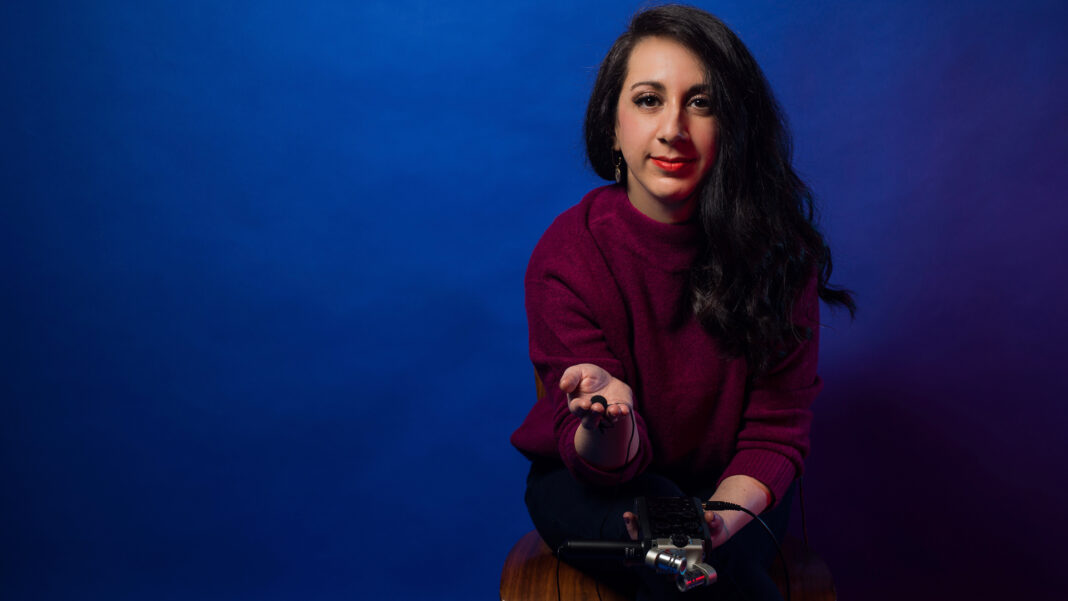“I had started writing this opera before the pandemic and before the world had shut down. And that version of the opera felt incredibly polite, so I scrapped it all to have, I wouldn’t say an impolite version of the opera, but one that maybe is a little more difficult to sit through because grief and conversations around racism are uncomfortable.” That’s how composer Mary Kouyoumdjian describes her first opera, Adoration, which is having its world premiere this weekend as part of the Prototype Festival in New York.

The opera is based on Atom Egoyan’s 2009 film of the same name. The libretto is by Royce Vavrek. The company performing Adoration includes Miriam Khalil, Marc Kudisch, David Adam Moore, Omar Najmi, Naomi Louisa O’Connell, Karim Sulayman, and the Silvana Quartet. The production is directed by Laine Rettmer.
Kouyoumdjian is a regular collaborator with Kronos Quartet. They will give the world premiere of a new work of hers at this year’s Kronos Festival in San Francisco. In May the New York Philharmonic will offer the world premiere of a musical documentary in which Kouyoumdhian collaborates with photojournalist Scout Tufankjian.
In our recent conversation Kouyoumdjian offered her perspective on the story Egoyan tells. (To see the full conversation, please go to our YouTube channel.)
“There’s a high school boy, Simon, who appropriates a real life news story,” she says. “This is actually the Handel affair in 1986. Someone planted a bomb on his pregnant fiance’s suitcase as she was flying to Tel Aviv, and Simon appropriates the story and convinces his classmates that this is about his own parents. As we are watching it, we know that his parents died of a car accident. But this social experiment that he has really reveals a lot of racism and complexities, both in his family and in the larger community.“
Which is the part that is uncomfortable and Kouyoumdjian wouldn’t have it any other way.
“I’m a strong, strong believer that discomfort in the arts actually prompts conversation,” Kouyoumdjian reveals. “Because when we feel discomfort, we want less of it in our world. I think it is a hard one to sit through for a constructive purpose, but I think it will be 90 challenging minutes for the audience.”
Adoration is not a work audiences should expect to find some comfort in by the opera’s conclusion. That is by design according to the composer.
“I don’t aim to offer relief because again, I think if you leave people with relief, then the piece is less inclined to foster a community that is more inclined to do direct change. I would never say that this opera will launch direct change. My main goal is to spark empathy because once we connect with a character, or just any human being on that fundamental human level, we have more understanding. Then I think we can more readily accept the uncomfortable.”
Given the number of characters involved in this story, Kouyoumdjian asked herself to write different forms and expressions of grief for each one.

“One of the challenges of this piece, one of the many challenges, [is] because Atom Egoyan writes incredibly complex stories where each character goes through immense psychological change – for better or worse. It’s incredibly layered. Every time I go into this story, I’m learning new things about the characters.
“One of the one of the wonderful things that he’s done is that as we explore each character, they each grieve in their own individual way, and the things that they’re grieving are incredibly different, whether it’s people or circumstance. That has allowed a lot of different ways to explore this incredibly universal area. It also has meant that over the course of the 90 minutes, people’s relationship to grief also changes quite a lot.”
From the first instinct to create an opera based on Egoyan’s film to the opera’s world premiere, this has been a five-year journey for Kouyoumdjian. Which means she’s spent a lot of time thinking about grief, writing music around the concept of grief and surrounding herself with the concept of grief. A daunting prospect for anyone which prompted me to ask her about how she protected herself during her work on Adoration.
“That has changed over the years. It’s hard. I tend to work in very intense bursts, and I tend to leave things for long periods of time. It’s hard for me to do a little bit of writing every day for a project like this, because I think that the psychological intensity of all of these characters and of the larger narrative is so demanding that to just pop in here and there doesn’t seem to serve the purpose of the work. So I’ll sort of binge write for a while, and then I will either move to something else or I love not writing. It’s really important to do other human activity in order to find any kind of brain space to be creative.”
Of course a story centered in the Middle East is going to have even more resonance given what’s going on in the world today than it might have had when Kouyoumdjian first embarked on the opera. It’s an idea that is not lost on her.
“We certainly don’t offer any solutions to what’s going on right now, because I don’t know how I possibly could, especially in 90 minutes. The story isn’t specifically about what’s happening right now. It just happens to pull from a tale as old as time, in which these types of conflicts have been going on for centuries, and this kind of racism has been happening for, well, we all know. It’s really about a grieving family. And if anyone has experienced grief, we all know that this brings out the best and the worst in people around you.”
In the end does Kouyoumdjian consider herself a political composer or is the act of composing itself a political act?

“I love how you phrase the latter in just the act of creation, whether it’s in your identity or the choice to make something or the choice of where it’s presented. All of these things are inherently political, which is what I tell my music history students all the time. Don’t for a minute think that Beethoven isn’t political. Forget even the Eroica symphony. Just the act of what a composer is doing, of who they are, of when, how, who funded – all of these things end up being political.
“I used to say that I wasn’t a political composer, but I was just interested in telling true stories. But with so much political conflict, especially things that are affecting my family, my community, so close to home, 1,000% yes! I feel incredibly lucky to live in a country in which there’s very little consequence for speaking out. And we do have, for the most part, freedom of expression, at least compared to other places in other communities. So I take that responsibility and privilege very seriously.”
To see the full interview with Mary Kouyoumdjian, please go here.
Photo: Mary Kouyoumdjian (Photo by Desmond White/Courtesy Mary Kouyoumdjian)











